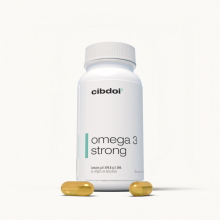Does Fish Oil Affect Gut Health?
Published:
Fish oil provides anti-inflammatory omega-3 fatty acids that offer numerous health benefits. With growing research on the importance of gut health, many wonder if taking fish oil supplements also affects the gut microbiome.
Contents:
- An Introduction to the Gut Microbiome
- How Omega-3s May Influence Gut Bacteria
- What Does Research Say About Fish Oil and Gut Health?
- Which Omega-3 is Best for Gut Health?
- How Much Fish Oil is Needed to Improve Gut Health?
- Are There Any Risks to Fish Oil for Gut Issues?
- Lifestyle Measures that Also Support Gut Health
- Does fish oil affect gut health? Conclusion
Preliminary evidence suggests omega-3 fats may influence gut bacteria species, enhance the intestinal barrier, and reduce inflammation. Here is an overview of how fish oil may impact gut health.

An Introduction to the Gut Microbiome
The gut microbiome refers to the trillions of bacteria and other microorganisms residing in your intestines.
These microbes play crucial roles including:
- Digesting and absorbing nutrients
- Synthesizing vitamins
- Regulating immunity
- Keeping pathogens in check
- Maintaining gut barrier integrity
However, poor diet, medication use, stress and other factors can disrupt the delicate balance of gut microbes. This can allow harmful species to proliferate and lead to increased intestinal permeability, inflammation, and disease development.
Optimizing your gut microbiome is crucial for overall wellbeing. Could fish oil and omega-3 supplementation be beneficial? Let’s analyze the current research.
How Omega-3s May Influence Gut Bacteria
Omega-3s from fish oil supplements provide several effects that may support a healthy gut microbiome, including:
Increasing beneficial species – Omega-3s may help increase levels of anti-inflammatory bacteria like Lactobacillus and Bifidobacterium strains while reducing pro-inflammatory lipopolysaccharides.
Strengthening intestinal barrier – EPA and DHA help maintain the mucous layer in the intestines and tight junctions between cells to prevent leaky gut syndrome.
Providing fuel for cells – Resolvins and protectins produced from EPA/DHA provide energy for cells in the intestinal lining to regenerate and heal.
Lowering inflammation – The potent anti-inflammatory effects of omega-3s reduce inflammatory cytokines, NF-kappaB activation, and quell gut inflammation.
Enhancing diversity – Omega-3s may support a more diverse microbiome composition, which is a sign of a healthy gut.
Through these mechanisms, daily fish oil intake may support favorable shifts in the gut microbiome and promote intestinal health.
What Does Research Say About Fish Oil and Gut Health?
A handful of animal and human studies have analyzed how omega-3 supplementation impacts the gut. Here are some of the key findings:
- Increased beneficial bacteria – Omega-3s increased Bifidobacterium, Lactobacillus, and Akkermansia muciniphila levels in mice and humans. These species produce beneficial short-chain fatty acids.
- Decreased LPS and inflammation – Rats and mice fed fish oil had lower lipopolysaccharide levels and inflammatory cytokines like TNF-alpha and IL-1 beta in the colon. This indicates reduced inflammation.
- Improved barrier integrity – Omega-3s increased intestinal alkaline phosphatase activity and expression of tight junction proteins like occludin and ZO-1 to prevent leaky gut.
- Enhanced microbiome diversity – One human study reported increased diversity of gut microbiota species in infants given an omega-3 supplement.
- Modulated metabolism – Omega-3s altered microbial genes related to metabolism of vitamins, amino acids and polyphenols. This suggests an overall modulation of metabolic activity.
The research is still preliminary. But findings suggest omega-3s provide anti-inflammatory and favorable microbiome modulating effects that support intestinal health.
Which Omega-3 is Best for Gut Health?
For optimizing the gut, EPA is likely the most beneficial omega-3. Reasons include:
- Greater anti-inflammatory potency – Numerous studies show EPA has more powerful effects on inflammatory markers than DHA. Reducing gut inflammation is key.
- Better absorption – EPA appears to be taken up into cells more effectively than DHA in those with intestinal inflammation and leaky gut.
- More impact on microbiome – In animal studies, EPA specifically increased Lactobacillus species and reduced LPS more than DHA.
- Improved symptoms – In a study of patients with UC, high-EPA fish oil improved symptoms like diarrhea and bleeding better than high-DHA oil.
For gut and intestinal health, choosing a fish oil supplement with at least 60% of omega-3s from EPA is recommended. Products with a 2:1 EPA:DHA ratio provide the best support.
How Much Fish Oil is Needed to Improve Gut Health?
Human studies use varying doses of fish oil to assess effects on the microbiome and intestinal health:
- Minimum dose – 500 mg EPA/DHA daily
- Moderate dose – 2,000 mg EPA/DHA daily
- Therapeutic dose – Up to 4,500 mg EPA/DHA daily
For maintenance in healthy adults, 500-1,000 mg per day is likely sufficient. Those with leaky gut, IBD or chronic intestinal issues may benefit from higher doses under medical supervision.
Always choose enteric coated or phospholipid fish oils if taking over 2,000 mg daily to minimize GI irritation. Check for purity as well.
Are There Any Risks to Fish Oil for Gut Issues?
The main potential fish oil side effects to consider include:
Digestive upset – Taking high doses of fish oil on an empty stomach may cause indigestion, nausea or diarrhea. Have with food.
Increased bleeding – Very high intakes may prolong bleeding time. An issue for those on blood thinners or with clotting disorders. Stay under 3 grams daily from supplements.
Fishy aftertaste – To minimize fishy burps or taste, take fish oil capsules that are enteric coated. Lemon mint flavors help too.
Immune effects – Omega-3s are generally anti-inflammatory and beneficial. But they may exacerbate Th2-dominant allergies in some people. Notice symptoms.
Otherwise, fish oil is very safe for long-term use at the dosages most people take. Still, work with your doctor if using therapeutic amounts.
Lifestyle Measures that Also Support Gut Health
While supplemental omega-3s from fish oil may be helpful, optimizing gut health requires a comprehensive approach:
Eat more fermented foods - Incorporate unsweetened yogurt, kefir, kimchi, sauerkraut and pickled vegetables to increase probiotic intake.
Increase prebiotic fiber - Eat more onions, garlic, bananas, oats, flax and leeks to feed beneficial gut bacteria.
Follow an anti-inflammatory diet - Emphasize whole, unprocessed plant foods, omega-3s and spices like turmeric while limiting sugar, fried foods and refined carbs.
Manage stress - Chronic stress negatively impacts gut microbiota. Try meditation, yoga, deep breathing and getting enough sleep.
Stay active - Regular moderate exercise provides anti-inflammatory effects.
Avoid unnecessary antibiotics - Overuse of antibiotics decimates gut bacteria. Only take when truly needed for infections.
A diet and lifestyle conducive to gut health, along with targeted use of probiotic and prebiotic foods provides the ideal foundation. Fish oil may offer additional anti-inflammatory benefits.
Does fish oil affect gut health? Conclusion
Emerging research indicates supplemental omega-3s from fish oil may support a healthy gut microbiome and intestinal barrier integrity through several beneficial mechanisms.
However, larger human trials directly analyzing parameters like microbiota species, inflammation markers, and intestinal permeability still need to be conducted.
Fish oil does appear safe and possibly advantageous for enhancing gut health, especially at doses of 1-2 grams of combined EPA/DHA. Those with IBD, leaky gut or chronic digestive issues may gain the most benefits under medical guidance.
While not a substitute for addressing overall diet, lifestyle and gut-supporting supplements, adding omega-3 rich fish oil may provide another tool for optimizing gastrointestinal wellness.















